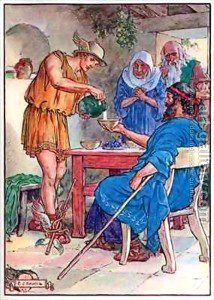
The Greeks say the gods love to travel in disguise. Zeus and Hermes once appeared as dusty travelers in a village where no one would welcome them except an elderly couple named Philemon and Baucis, who realized their guests were no ordinary beings when a pitcher of wine remained full however much they drank. In Greek folk tradition, it’s good policy to be nice to strangers, and to pay attention to what they say, because you never know who is traveling behind their masks.
On a visit to England, I landed at Heathrow on a red-eye flight, exhausted and burdened with financial worries. I was carrying too much baggage and had to wrestle an oversize suitcase down the steps to the Underground.
As I collapsed onto a seat on the train, a roly-poly man, bearded like Santa Claus, winked at me from the seat opposite. He said with a broad grin, “The Buddha says — walk on the bridge, don’t build on it.”
The words slapped me in the face. They stung me awake. They were exactly what I needed to hear. Caught up in my immediate worries, stressed out and overtired, I had been forgetting one of the secrets of living the Incredible Journey: it’s the journey, not the destination, that counts.
The stranger on the London Tube was an example of how we play everyday angels — even gods in disguise — for each other. There is a provocative Buddhist text on this theme entitled Entry into the Realm of Reality (in the Thomas Cleary translation). It describes how authentic spiritual teachers — even the greatest who walk this earth — can appear in any guise, as an exotic dancer or as a monk, as a panhandler or a king, as a scholar or a warrior.
We are most likely to run into them when we are in motion, especially when we are crossing a border into unfamiliar territory, when strong emotions are in play, and when we are facing the greatest challenges. They take the forms we can perceive and receive.
For more on this theme, please see The Three “Only” Things: Tapping the Power of Dreams, Coincidence and Imagination by Robert Moss. Published by New World Library.

